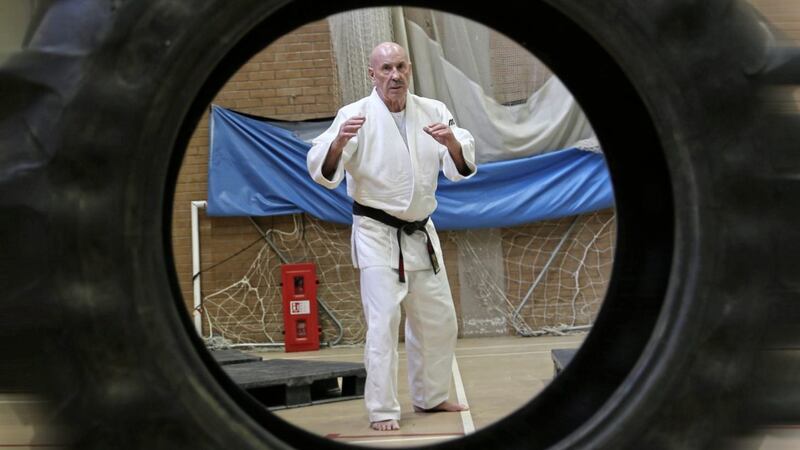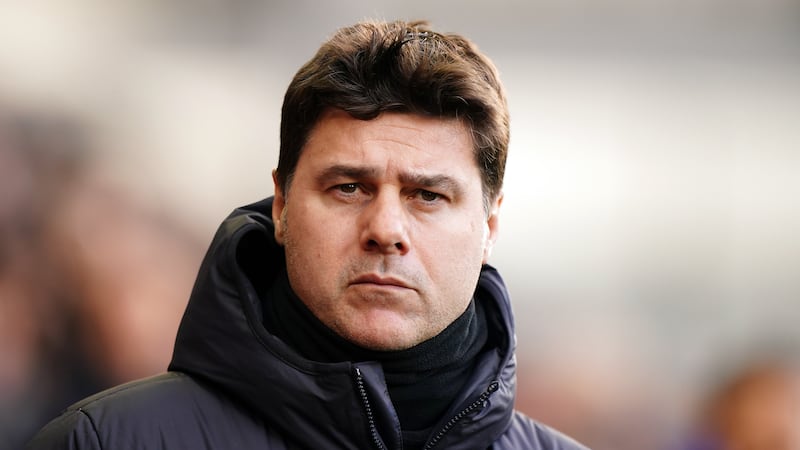MEDALS, trophies and pristine white certificates fight for position on crowded shelves in the kitchen corner, a blur of gold, silver and bronze two deep, three in some places.
The adjacent wall is barely visible beneath framed pictures of podium finishes, wide grins for the camera in all, the same face but different as success spans the ages.
A chest of drawers on the right holds dozens of passport-sized booklets charting the journey: Las Vegas. Tokyo. Budapest. Brussels. Vienna. Linz. Toronto. Prague. Tours. Rio de Janeiro. Paris. Madrid.
Twenty-two international medals and counting.
Mexico City will be added to the list next year in a remarkable life midway through its eighth decade, but the globe-trotting and medal collecting tell only half of the Harry McGuigan story.
A striking sense of adventure burns brightly throughout, from a chance introduction to the world of judo in 1960s Hong Kong to the unlikely series of events that led him to find love in Cuba later in life.
His relationship with the sport he loves has been a turbulent one. Three broken ribs, cruciate ligaments, countless shoulder tears, a ruptured bicep and a grade three hamstring tear that left him lying motionless in a non-descript hall in Belgium, imagining he was watching himself floating towards the ceiling, have pushed him towards the edge.
Six times he has walked away, the first occasion in 1982, aged 40, the last just three years ago.
Yet six times he has come back.
“I can’t say I’m retiring again, I’ve far too many watches as it is…”
Despite the roll call of injuries, teaching, training and learning have helped keep the 75-year-old’s mind and body young.
When we meet, McGuigan has just returned from a 9am gym session – a staple of his daily routine through the week.
The Egg McMuffin/strawberry milkshake combo, hastily consumed on the Thursday morning drive down to Dungannon, gurgle uncomfortably as details of his workload are discussed.
Legs, shoulders and triceps took the load today, three sets of 10, along with some abdominal exercises and cardiovascular work. Tomorrow, it will be on to the bench press as chest, back and biceps take priority. Eighty kilos, he explains, is a “comfortable” lift.
Later on in the day, starting at 4.15pm, up to 30 pairs of young eyes will be on him at the Torrent Complex in Donaghmore. There are also judo classes at Dungannon leisure centre on Monday evening, two on a Wednesday and a final session on Friday.
When evening comes, he will further his Irish at Hill of the O'Neill visitor centre in the square. The previous morning had been spent talking football, culture and Catalonian politics at a two hour Spanish conversational class at Queen’s University.
On the way to Belfast, he met one of his students on the bus.
“When I told him where I was going he says ‘you’ll probably be the oldest one there’. I had to tell him I’m the oldest one wherever I go - tournaments, training... if I go into the bar on a Saturday night, I’m the oldest.
“We had a good laugh about it. Who cares? I know I don’t, never have. If you spent your life thinking about miles on the clock or things like that, you’d never leave the house.
“I’ve always tried to get the most out of everything while I can...”
**************************************
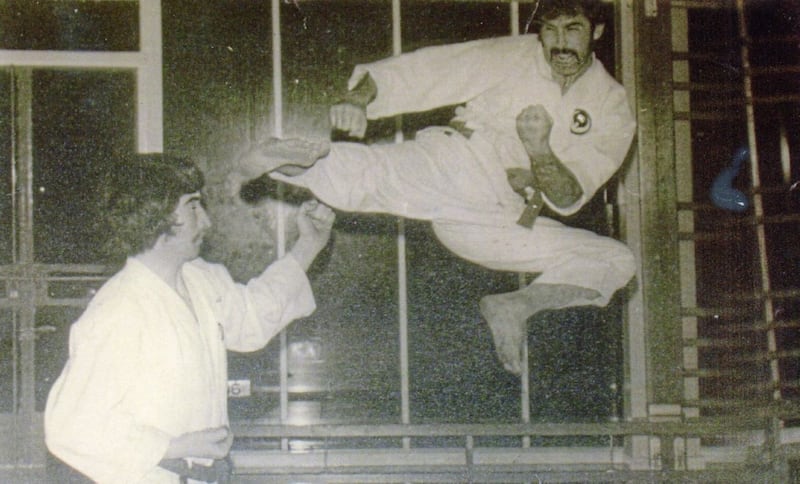
“Cad é mar atá tú, Harry?” “Wo hen hao, xiè xiè. Ni hao ma?”
KAI Tak airport. Two days the journey took, with layovers in Istanbul and Bombay breaking up the long hours spent on a rattling tin can carrier.
Harry McGuigan had long been fascinated by the world of aviation. It was in the family you see. His dad, also Harry, was a bomber pilot during World War Two and used to regale his awestruck son with dramatic tales of narrowly avoided German attacks and mid-air near misses when his workplace was in the sky.
“Thank God he got through it alive.
“I was born in ’42 and the war was over in ‘45 so I didn’t see a lot of him, but he used to tell me all the stories, and I loved hearing them.”
Upon completion of an air traffic control course, an assistant’s post at Kai Tak was advertised. He sent an application away expecting never to hear another word, only for a letter to drop through the door confirming his appointment and expected arrival date.
It’s a long way from Dungannon to Hong Kong; it was even further in 1961, but a two-and-a-half year contract was swiftly agreed.
Aged just 19, he packed his bags and bid farewell to Ireland, setting off on the first of a lifetime worth of adventures - and one that would inadvertently lead to him stumbling upon his sporting vocation.
“When I was growing up, we lived out in the country for seven or eight years. You had nothing. Our sport was jumping rivers and climbing trees, having races in the street.
“I joined a gymnastics club in the town, then the boxing club, I was in it for years. I went to St Patrick’s Academy and played Gaelic football, was on the MacRory Cup panel, and I enjoyed all of that.
“But I wanted to see a bit of the world and once I got myself set up in Hong Kong, me and a friend - Jimmy Matthews from Limerick - enrolled in a boxing club.
“Then one day we arrived and there was a judo exhibition on. We stood and watched, and I just remember thinking ‘God... I like that’.”
McGuigan’s interest had been piqued but, in those early days, mastering the day job was still his primary concern.
Entering a multi-cultural, bilingual environment heavily dependent on clear communication skills forced his hand. Colleagues began to school him in basic Chinese and he, in turn, taught them bits of Irish.
“It got to the stage where they’d come in in the morning and say ‘cad é mar atá tú, Harry?’ And I’d say ‘táim ceart go leor - ni hao ma?’ [how are you?]… ‘wo hen hao, xiè xiè’ [I’m fine, thank you].
“Sometimes if the rescue boats were on standby, I’d answer the incoming call and you’d hear them all tittering away on the other end because of my accent.
“But I picked up a fair bit, to the point where I’d have been able to hold a conversation okay.”
And also to the point where he could trade bizarre insults with the natives, if the occasion arose.
“They taught me how to curse. There are some really strange sayings – ‘may the dogs urinate on your grandfather’s grave’. That’s a wild one, there’s much, much worse, but I still learnt them all in case I ever got into an argument!”
Away from work, judo was becoming an ever more serious concern and McGuigan became an established student of Professor Wong Lun, president of the Hong Kong Budokwan. A love affair with ‘the gentle way’ had officially begun.
By 1964 he had reached green belt, the fifth rung on the grading ladder, but that part of the journey was over as his stint in Hong Kong drew to a close.
Now it was time to head for home and start spreading the gospel.
**************************************
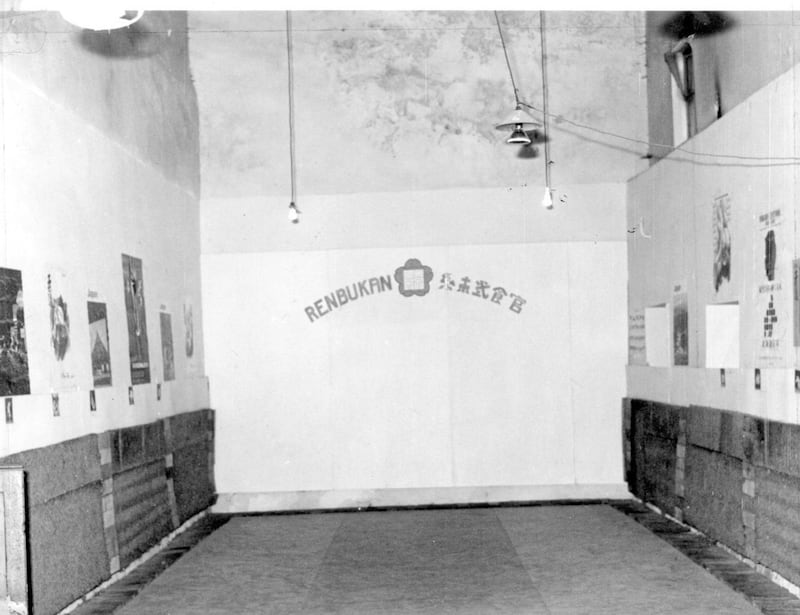
“Harry, there’s a teacher, a Presentation Brother, up at the school. He wants to meet you”
THROWING a man of the cloth around a classroom was not something Harry McGuigan expected to be doing of a Monday afternoon but a first meeting with Brother Michael McKeown, known as Brother Lewis, proved to be a defining moment.
“It was my cousin who came around to the house and told me Brother Lewis wanted to see me up at St Patrick’s intermediate, now St Patrick’s College.
“He was an orange belt, same height as me, and had done a bit of training in Cork. We started practising on these old mats that you wouldn’t be allowed to use now for health and safety reasons, and it became a sort of a regular thing.
“After school, we’d push the desks back, roll out these mats and start throwing each other about. Some students used to come up and watch us, then more would come and watch us, then more…”
A light switched on in both men's heads.
If these young people were interested enough to come and watch us, maybe they might want to learn how to do it themselves?
From that germ of an idea in 1967, the Ren Bu Kan club was born, opening its doors a year later – the first judo club in the north.
“You could see there was an interest there, so we started to do a bit of fundraising. There was a place underneath the old national foresters in Dungannon, at their old premises in the square, and that’s where we built our first mat.”
Unfortunately for McGuigan and Brother Lewis, their timing wasn’t great. The Troubles kicked off in the late ‘60s and, on many occasions, they had only each other for company inside the club’s four walls.
“It was very difficult. I saw nights going up to the club and there was only Brother Lewis and myself there because there were soldiers on the street, a bomb nearby, somebody had been shot, whatever…
“But we felt we had to be there in case anybody showed up. We’d just practise ourselves, batter each other around the mat for an hour and then go home. That went on for a long time.”
In 1974 a car bomb exploded in the centre of Dungannon, showering the club’s mat with glass and shrapnel and forcing Ren Bu Kan’s founding fathers to look elsewhere.
St Patrick’s College became home for a time, then the further education college where McGuigan worked for 27 years as a sports coach.
New premises were soon located near the town’s bus station before, in 1993, a final move to Dungannon leisure centre – the place he has called home ever since.
Next year is the Ren Bu Kan club's 50th anniversary and a conveyor belt of champions continues to roll
Next year will mark the club’s 50th anniversary, and a conveyor belt of champions continues to roll. Just over a week ago 20 medals came home from the national championships in Dublin; three gold, five silver and 12 bronze.
Avril and Joyce Malley, two of the north’s most famed judoka, are among those to have passed through Harry McGuigan’s hands. His own daughters, Seanna and Rosealla, became Irish champions before Seanna’s children Niall and Eva followed suit, winning national honours.
There can’t be too many households the in Ireland that has three generations of Irish champions, but the McGuigans do.
And the family’s figurehead is still flying the flag with pride.
In 2014 he won World Championship gold in Spain and just last month was conferred the ultimate honour, becoming the first person in the 54-year history of the Irish Judo Association to be promoted to the rank of seventh Dan.
“You can only fight your way up to fifth Dan and then sixth Dan is an honour from your country. But a seventh Dan has to be awarded by the International Judo Association, so it was a very proud moment.”
And it is an achievement made all the more remarkable by the bumps on the road that have occasionally sent him into self-enforced exile along the way.
“The first time I retired when I was 40, the guy I beat in the Irish final was 18 years of age and one of my students. You’re just thinking; what am I doing here? A man of my age maybe depriving these young ones of getting a title?
“So I packed it in.”
That was in 1982 and, after a brief return to action six years later, he didn’t compete again until the new Millennium.
The loss of wife Kathleen in 1999 took a huge toll, but in 2002 McGuigan was persuaded to make a comeback at the age of 60.
“I was down, I didn’t know what to do, and when my good friend Willie Lyons mentioned the judo again, I took a bit of convincing but decided to go back and give it another go.”
A slew of medals followed as McGuigan took the masters scene by storm but, little did he know, retirement number three was just around the corner as life was about to take another unexpected twist.
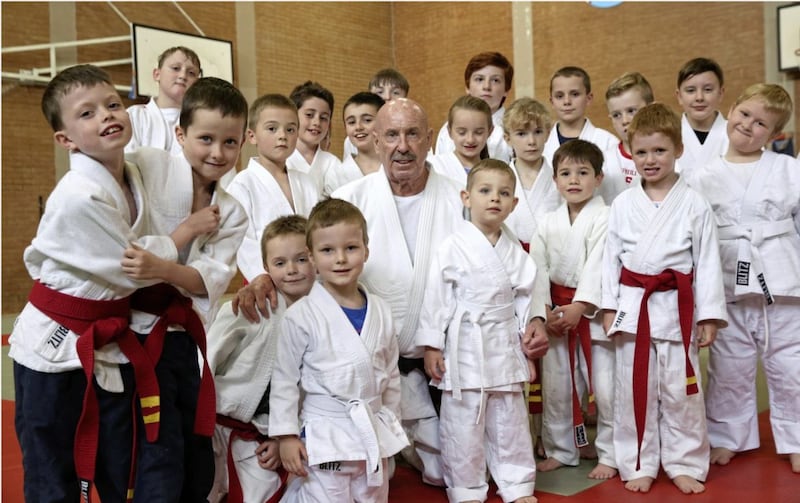
**************************************
When Cuba beckons...
IT could have been Buenos Aires. Maybe even Guadalajara. But then, surveying his options, the decision was made.
“Cuba,” he thought, jabbing his finger at a map. “That’s where I’ll go.”
A five-week course run by the don Quijote language school offered a seemingly endless choice of countries and cities for those wishing to improve their grasp of Spanish.
“I was very nearly going to Havana when I looked at it first, but then I decided to go to Santiago de Cuba, the second biggest city. Then you had the option to stay in a hotel but I decided to stay with a family to blend in more.
“In that environment, nobody speaks any English so you have no choice but to learn if you’re sitting at the dinner table.
“And, as fate would have it, that’s how I met Oannis.”
Oannis Santiesteban was part of the family McGuigan would stay with, and a friendship was struck up from the off.
“We talked every night, she helped me with my Spanish – she had no English at all. Not a word. So I had to express myself, I told her all about my family, about Ireland. I even told her about the revolution in 1916, compared to the Cuban revolution.
“I demonstrated how you play Gaelic football out on the balcony. It was hilarious, but she loved that.
“And our first date, if you want to call it that, was Mass. I was going to visit a cathedral on the Sunday, I’d only known her four or five days, and asked if she wanted to come along.”
Eyebrows were raised on both sides of the house as romance blossomed.
“The mother was a wee bit sceptical - a foreigner, extranjero. After a while they accepted me but they all thought once I returned to Ireland, that would be the end of it.
“My family were obviously wary at first because Oannis is 30 years younger than me. It’s not something I expected to happen or had planned for.
“I suppose they thought it was a phase and it wouldn’t last, that she would be going back to Cuba, which a lot of people thought. But she’s here to stay.”
Nine times McGuigan was in Cuba before the pair eventually tied the knot in August 2010 and, despite returning home alone, by Christmas they were living in Dungannon.
He has since adopted Oannis’s daughter Maria Karla, now 11, and every summer now is spent on the Caribbean island.
Not being able to get to the gym kills him, but it’s worth the sacrifice. The world around him has changed and, typically, he has changed with it.
Spanish is the first language in the house now, and all around there are Cuban artefacts and nods to his wife and daughter’s heritage.
Yet it is the gleaming haul in the corner that takes your eye first, one that continues to grow year on year - a testament to all Harry McGuigan has achieved since those early days in Hong Kong, and a life still being lived to the full.
